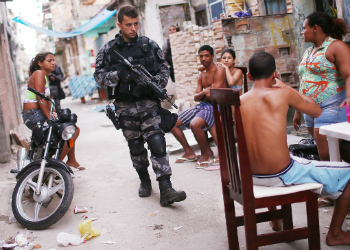New statistics show that police in Rio de Janeiro, Brazil continue to use lethal force at high rates, a dynamic that is likely the result of poor training and widespread impunity for abuses by security forces.
Brazil’s Institute for Public Security (Instituto de Segurança Pública – ISP) reported that police forces in the state of Rio de Janeiro killed 84 people in February 2017, a 71 percent increase compared to the same month last year, when ISP registered 49 killings. (See InSight Crime’s chart below)
The increase is part of an ongoing trend. Killings by police have generally increased over the past several months, reaching a peak of 105 in December 2016 — a staggering figure considering only 28 killings were reported for the same month a year before.
Since March 2016, according to the ISP’s data, the monthly number of killings by police has always exceeded the figure registered for the same period the previous year.
To be sure, the number of incidents of use of deadly force has slightly decreased in the past three months, dropping from 105 in December 2016 to 84 in February 2017, but killings by police continue to be a concern across the state.
SEE ALSO: Coverage of Police Reform
Advocacy groups such as Amnesty International and Human Rights Watch have found evidence that killings by police in the city of Rio de Janeiro have often been illegal, as security forces shot unarmed or wounded suspects.
But police authorities counter that the use of deadly force has increased as a result of the deterioration of the security situation across the state.
“Police officers must flip a switch in their heads, at times acting as defenders of rights and other times as warriors, because there’s a real war,” Ivan Blaz, a spokesperson for Rio’s military police, told O Globo.
The number of civilians killed by police far outstrips the number of police killed by civilians. While at least 140 people have been killed by Rio police so far this year, just 46 officers have lost their lives, on and off duty, according to Blaz.
In the latest incident of excessive police violence in Rio, a cellphone video shot during a gun battle between security forces and suspected members of a drug gang showed officers executing two men lying on the ground outside a school, the New York Times reported. A 13-year-old schoolgirl was also killed in the crossfire. The two officers have been arrested.
InSight Crime Analysis
The high number of killings by police in the state of Rio de Janeiro has been linked to poor police training practices and widespread impunity in cases of alleged abuses committed by security forces.
A 2014 study published by the Center of Applied Judicial Research (Centro de Pesquisa Jurídica Aplicada – CPJA), shed some light on the violence and bullying that police offers are often subjected to during training.
Of the 21,000 public security officers interviewed in the CPJA report, 39 percent stated they had suffered physical or psychological torture during training; and 64.4 percent said they had been disrespected or humiliated by their superiors.
SEE ALSO: Brazil News and Profiles
The findings are worrisome, as the violence police officers suffer from during training seems to influence how much force they will be ready to use when interacting with the general population.
“How am I going to serve society being trained like that? It’s ridiculous,” a former military policeman told Agência Publica in 2015. “Police have to learn quick thinking, the ability to make decisions. But right now they train police as they would a dog for a street fight.”
Other studies have linked the widespread use of lethal force by security agents to the impunity they enjoy in court. According to Amnesty International, police killings are normally classified as “resistance killings,” in a way that places blame on the victims while generally absolving the officers responsible for their deaths. Of the 220 homicide investigations into police forces started in 2011 in the city of Rio, Amnesty reported that after four years, only one officer had been charged.

